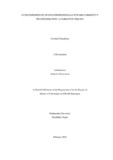
Please use this identifier to cite or link to this item:
https://hdl.handle.net/20.500.14301/502| Title: | Lived Experiences of I/NGO Professionals Toward Community Transformation: A Narrative Inquiry. |
| Authors: | Chaudhary, Govinda |
| Citation: | Chaudhary, G. (2025). Lived experiences of I/NGO professionals toward community transformation: A narrative inquiry. |
| Issue Date: | Feb-2025 |
| Publisher: | Kathmandu University School of Education |
| School: | SOED |
| Department: | DOSE |
| Level: | M.Phil. |
| Program: | MPhil in STEAM Educaiton |
| Abstract: | My study explored the experiences of I/NGO professionals' contributions toward community transformation through their narratives. With a key research question, how do I/NGO professionals account for their lived experiences of being involved in community transformation? I commenced academic research, using narrative inquiry and applying critical social theory, covering four different I/NGO professionals. My research paradigm is multi-paradigmatic and includes interpretivism, criticalism, and postmodernism, which deal with multiple realities and critical analysis and expression in different ways of the arts. I explored how I/NGO professionals contributed to transforming whatever they do for or with the people. I purposely selected the four research participants, my former colleagues from different I/NGOs. In my research, to ensure quality standards, I used praxis as a democratic inquiry method, incorporating inductive knowledge from fieldwork. I emphasized interpretivism and criticalism, fostering reflective awareness and transformative learning. Critical reflexivity was crucial, involving self-awareness and challenging epistemological choices. Additionally, I employed peer debriefing with knowledgeable external peers to enhance research quality, providing detailed briefing documents. This study applied a qualitative research method, where participants' information was collected through a narrative inquiry method. The insight from this research explored I/NGOs' experiences of the participants who had been working in different sectors but mainly with individuals and community people. The major finding of this study is that the professionals of I/NGOs are active and innovative, often seeking from the organization to be motivated in different ways, both extrinsically and intrinsically. In terms of community transformation, themes like self-motivation, individual empowerment, unlearning and adaptability, inclusive engagement, Community-Based Rehabilitation approaches and social dialogues, and respecting diverse perspectives and reintegration are needed. Contributing positively to change in society, both individual and collective efforts are needed, and there is a strong alignment with the government and people’s priorities with changing concepts of the organizations (I/NGO). The professional contribution towards community transformation seemed outstanding by applying various approaches and individual efforts to change the community by empowering individuals and creating a welcoming environment in the community for sustainable development. Even though the efforts were small, they seemed like a pillar to take initiatives. As a result, the research findings will help stakeholders realize the advantages of employing narrative inquiry and professional experiences towards changing the community for sustainability. Furthermore, this study empowers I/NGO workers to be active in community transformation going beyond their everyday professional engagement in development activities. Finally, the I/NGO workers are facing criticisms in their everyday life, and despite their weaknesses, it is expected that the narratives of I/NGO professionals’ contribution in social changes present their potential roles in community transformation. It allows change agents like I/NGOs act as the leaders of community transformation benefitting the sustaining of what they do in their professional life |
| URI: | https://hdl.handle.net/20.500.14301/502 |
| Appears in Collections: | Dissertation |
Files in This Item:
| File | Description | Size | Format | |
|---|---|---|---|---|
| Govinda Chaudhary_Print version 2025(1).pdf | 1.74 MB | Adobe PDF |  View/Open |
Items in DSpace are protected by copyright, with all rights reserved, unless otherwise indicated.